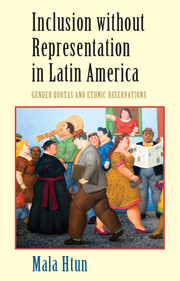Book contents
- Frontmatter
- Dedication
- Contents
- List of Tables and Figures
- Preface and Acknowledgments
- List of Acronyms
- 1 Introduction: Politics of Inclusion in Latin America
- 2 Women, Afrodescendants, and Indigenous Peoples in Elected Office
- 3 Gender Quotas: Why and How?
- 4 Indigenous Reservations and Gender Parity in Bolivia (written with Juan Pablo Ossa)
- 5 Political Inclusion in Colombia
- 6 Brazil: Combatting Exclusion through Quotas in Higher Education
- 7 After Quotas: Women's Presence and Legislative Behavior in Argentina (written with Marina Lacalle and Juan Pablo Micozzi)
- 8 Conclusion
- Appendix 1 Research Trips
- Appendix 2 Mechanisms of Inclusion
- References
- Index
2 - Women, Afrodescendants, and Indigenous Peoples in Elected Office
Published online by Cambridge University Press: 18 December 2015
- Frontmatter
- Dedication
- Contents
- List of Tables and Figures
- Preface and Acknowledgments
- List of Acronyms
- 1 Introduction: Politics of Inclusion in Latin America
- 2 Women, Afrodescendants, and Indigenous Peoples in Elected Office
- 3 Gender Quotas: Why and How?
- 4 Indigenous Reservations and Gender Parity in Bolivia (written with Juan Pablo Ossa)
- 5 Political Inclusion in Colombia
- 6 Brazil: Combatting Exclusion through Quotas in Higher Education
- 7 After Quotas: Women's Presence and Legislative Behavior in Argentina (written with Marina Lacalle and Juan Pablo Micozzi)
- 8 Conclusion
- Appendix 1 Research Trips
- Appendix 2 Mechanisms of Inclusion
- References
- Index
Summary
In Latin America's history, women, Afrodescendants, and indigenous peoples were juridically excluded from full citizenship rights and politically disenfranchised (see, e.g., Andrews, 2004; Graham et al., 1990; Harris, 1964; Miller, 1991; Mörner, 1967; Wade, 1997). Over time, legal discrimination was reformed (at variable rates across countries and groups), but the patterns it forged remained. Inter-group differences in well-being today show a remarkable parallel to the sistema de castas created under the Spanish empire. Education, income levels, and experience of discrimination largely track skin color, with whites at the top and people with the darkest skin at the bottom (Telles, 2014b). Latin America's homosocial elite has anchored a status hierarchy privileging whiteness and maleness. Almost nowhere are women, Afrodescendants and indigenous people present in elected office in proportion to their overall numbers in the population. The political exclusion of disadvantaged groups reflects, and perpetuates, their subordinate social positions. Women, Afrodescendants, and indigenous peoples suffer lower wages; discrimination; a higher probability of being poor, unemployed, and living in inadequate conditions; and a greater likelihood of victimization and violence. These social and status inequalities are at odds with an inclusive, democratic society.
This chapter describes patterns of exclusion in Latin America by presenting data on the presence of women, Afrodescendants, and indigenous peoples in elected office. Women's numbers have grown in several countries, in some places dramatically, as a result of the introduction of gender quota laws. Indigenous peoples and Afrodescendants tend to be scarce in elected office, though their presence has risen in some countries. None of these excluded groups tend to cluster in their own party or set of parties. All tend to be elected from parties throughout the political spectrum. This chapter also describes the different mechanisms countries have adopted to promote inclusion, including candidate quotas in parties and reserved parliamentary seats. Appendix 2 presents a list of inclusion mechanisms used worldwide.
Terminology
In general, I use the term “Afrodescendant” to refer to people not currently living in Africa, or born there, but with ancestors originating from the region. The term was not very common as recently as ten years ago. Many scholars referred instead to “Afro-Latins” or more specifically to “Afro-Colombians,” “Afro-Brazilians,” “Afro-Cubans,” and the like, and also to “blacks” (see, e.g., Andrews, 2004; Sawyer, 2006; Telles, 2004; Wade, 1993). Scholarship published since 2010, however, has used the term “Afrodescendant” almost exclusively (see, e.g., Loveman, 2014; Telles, 2014b).
- Type
- Chapter
- Information
- Inclusion without Representation in Latin AmericaGender Quotas and Ethnic Reservations, pp. 20 - 43Publisher: Cambridge University PressPrint publication year: 2016



